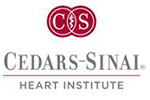
Fellow of the American College of Cardiology
Licensure: State of California G49915
Place of Birth: Los Angeles, California
High School: Alexander Hamilton HS, Los Angeles
Undergraduate Studies: University of California, Los Angeles, Class of 1977, Magna Cum Laude
Medical School: The George Washington University, Class of 1981
Residency and Chief Residency: UCLA-Sepulveda VAMC 1981-1985
Cardiology Fellowship: UCLA-Sepulveda VAMC 1988-1990
Faculty Appointment: Associate Clinical Professor of Medicine/Cardiology, current
Special Certifications: Heart Rhythm Society, Testamur, Pacing, Cardioversion and Defibrillation
Scope of Practice: General Adult Cardiology including coronary artery disease, heart failure and cardiomyopathy, heart rhythm disorders.
Special areas of Expertise and Interest:
- Implantation of all types of pacemakers and defibrillators
- Echocardiography including stress echo and transesophageal echo
- Cardiac Causes of Stroke
- Lipid Disorders
- Nutrition and Exercise to treat heart disease
Personal Statement:
As a cardiologist, I see a medical world that is at once exciting and challenging. The excitement comes as scientific and technological research continues to answer important questions and give us solutions to our patient’s problems. Challenges come in the form of a fragmented health care system that is economically strained.
While much of heart disease is genetically determined, there is a strong environmental impact. This is the old Nature vs. Nurture controversy. It plays out in the field of cardiology as well. While some disorders have a pure genetic basis, most diseases develop as a result of interaction between our genetics and our environment. This means that we have some control over our destiny. We can choose to not smoke, to drink in moderation, to exercise and to make dietary choices that promote health. I tell all of my patients who have or are at risk for heart disease that exercise and nutrition have as much impact as many of the medications that we prescribe.
I view my relationship with patients as a partnership. There are things you can do to help me deliver better care to you. Being organized and prepared for you office visits is extremely important. Bring a list of questions, bring a list of your medications, bring an updated health history if there have been changes between visits. Know what medications need to be refilled. If your history is complex, type it up and update it as needed. This will help all doctors that you may need to see.







